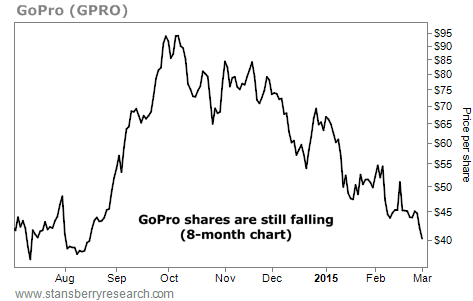| Home | About Us | Resources | Archive | Free Reports | Market Window |
|
Editor's note: This week we're featuring some of the top ideas from Dr. David Eifrig's Big Book of Retirement Secrets. Yesterday, we kicked off the series with six of Doc's favorite ways to live healthier and happier in 2015. Today, we conclude the list with Doc's top six health tips this year. We call it...
The Most Important List You'll Read All Year, Part IIBy
Tuesday, March 3, 2015
As I mentioned yesterday, I spend all year thinking about simple ways to live a healthier, happier life.
It's not as drastic – and it doesn't take as much work – as you might think. I'm not suggesting you start running marathons or drinking kale smoothies. Though even if you start doing just one of these things this year, I'm confident it will improve your life.
Yesterday, I shared six of my top 12 health tips. Today, we'll cover the rest of the list...
6. Air – This year, I'm combining two of last year's categories – clean air (No. 9) and aromas (No. 11) and moving them up in importance.
Polluted air is filled with various particles so small that they can get into your lung tissue and blood stream. They cause cancer, reduce the effectiveness of your immune system, and damage your respiratory system. Having excessive dust, dirt, or smoke in your home can lead to chronic inflammation... leading to more colds and heart attacks. Breathing clean air is an essential part of having a healthy year. I keep an air purifier in my bedroom, where I spend almost a third of my life.
Good smells in the air around you are also important. Aromas can improve your mood, trigger positive memories, help you sleep, and improve concentration. Some – like the combination of lavender and pumpkin pie – can even increase the male libido.
5. Meditation – People who meditate have lower blood pressure, less heart disease, and better oxygen uptake – and they also report feeling less stressed. Meditation has benefits similar to exercise but without the wear, tear, and stress on your body that happens during training.
Many people are afraid of meditation's religious connotations. And it's true devout religious people use this technique when they pray. But you don't have to be religious to invoke the body's abilities.
Try what I do and sit in a chair (or in bed) with my neck and shoulders balanced and relaxed, feet on the floor and hands interlocking on my lap. I think of just one word, such as "one" or "omm" or "peace." When my mind drifts to other things, I slowly and softly bring it back to that word. Taking deep, but not forced, breaths, I let my mind and body go where they want to for 15 or 20 minutes. This is my time to relax my mind and focus on my breathing, body, and being in the moment. (No chanting involved.)
4. Sun – Sunlight lowers the risks of several cancers. The vitamin D produced by the body from sunlight may be critical in preventing diseases such as multiple sclerosis and depression.
Some people would rather take a pill to get their vitamin D than go outside for 20 minutes a day. But there's a catch... The vitamin D we get in our food requires sunlight to chemically activate and become useful. So go spend some time outside, instead of relying on a pill.
The Institute of Medicine, a group with no pills to sell and no ax to grind, recommends people get between 400 and 800 international units (IU) of vitamin D per day, depending on your age. If you live in a northern climate, do what I do and take 800 IU every other day, but still go out and get sun on your face and hands (if it's not too cold).
3. Vegetables – Most Americans only eat about 1.5 servings of vegetables per day. A study published in the Journal of Epidemiology and Community Health in 2014 suggests eating up to seven servings of fruits and vegetables per day lowers your risk of dying from any cause. But it also noted it's likely the vegetables doing the work. I concur.
Vegetables are low-fat, low-calorie, and high in fiber. Green leafy vegetables like spinach and kale are some of the most nutrient dense. Plus, spinach promotes muscle growth. (Popeye had the right idea.) According to researchers at the Karolinska Institute in Stockholm, nitrate – a compound in spinach – strengthens fast-twitch muscles. Fast-twitch muscles are the ones your body uses for high-intensity exercises.
Vegetables are easy to dress up or hide in other foods. I put a little olive oil and lemon on my salads. Or you can hide spinach in a fruit smoothie.
2. Movement – Exercise improves your mood and boosts your immune system. And one excuse people use for not exercising is a lack of time. Well, this year's most fascinating science results are coming in fast, and time can no longer be an excuse.
According to a new study from McMaster University, people who did just one minute of intense exercise as part of 10 total minutes of exercise (the nine other minutes were a slow walk), three days a week for six weeks, lowered their blood pressure and increased their endurance by 12%. Researchers called it sprint interval training (SIT). All it takes is 30 minutes a week to see benefits.
If you're interested in learning more, I recommend reading Body by Science by John Little and Fast Exercise by Michael Mosley.
1. Sleep – Sleep has returned to my No. 1 most important health secret. This past fall, I kept getting sick. Usually, I get through cold and flu season unscathed. However, before winter hit, I had gotten sick twice in eight weeks. The fix was easy.
I had started reading on a backlit tablet in bed that emits blue light. Blue light is just one color of light that electronics like laptops and tablets give off. But (as I briefly mentioned yesterday) it's the one that's the most disruptive to circadian rhythms. Think of the circadian rhythm like a clock that signals our bodies the optimal time to do things, like falling asleep and waking up. Blue light also stops the release of melatonin – the hormone that makes you sleepy.
To give your brain time to get ready to sleep, shut off your electronics an hour before bed. Keep the lights dim and the shades covered.
These tips are the best ways to get started living a healthier life. As I said before, please start using these tips immediately. But just try one (or two) at a time. After a few months, you'll have built them into your life as regular habits.
Here's to our health, wealth, and a great retirement,
Dr. David Eifrig Jr.
Further Reading:
For more of Doc's latest "armchair wisdom" right here:
Five Simple Ways to Increase Your Wealth in 2015
"If you don't do this, you will likely never, ever be wealthy." Use This Simple Tax Move for an Instant 33% Return
"Today, I'll cover the huge benefits offered by opening an IRA..." Are You Guilty of Thinking This Way?
"Despite the six-year bull market in stocks, we're still seeing these opportunities in the market today. Don't let misplaced fear keep you from taking advantage of them..." Market NotesTHIS POPULAR STOCK IS STILL FALLING One of America's most popular stocks is down more than 50% in five months... and DailyWealth readers shouldn't be surprised.
Back in September, we wrote a bearish note on GoPro, the innovative video-camera company. GoPro makes durable cameras you can attach to a helmet, a car, a surfboard, or even a dog. After going public last year, GoPro became one of the country's most popular stocks.
GoPro was so popular that investors bid the company to the sky-high crazy valuation of 10 times sales. We noted this overvaluation and said, "this expensive stock will suffer a huge correction soon." Shares were trading for $93.
As you can see from the chart below, our call was well-timed. GoPro has steadily declined since our note. Just yesterday, news broke that GoPro has new competition from China... and the stock fell another 4% to $40. Shares are down more than 50% since our note and now trade at their lowest level since August of last year.
 |
Recent Articles
|



